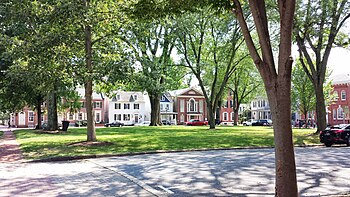Dover, Delaware: Difference between revisions
Pat Palmer (talk | contribs) mNo edit summary |
Pat Palmer (talk | contribs) mNo edit summary |
||
| (4 intermediate revisions by the same user not shown) | |||
| Line 1: | Line 1: | ||
{{subpages}} | {{subpages}} | ||
'''Dover, Delaware''' is the [[Capital city|capital]] city of the [[United States of America|U.S.]] state of [[Delaware]]. As of 2020, its population was 39,403. It is also the Kent County seat. | {{Image|Dover Green, Dover, DE.jpg|right|350px|The Dover town green in 2013.}} | ||
'''Dover, Delaware''' is the [[Capital city|capital]] city of the [[United States of America|U.S.]] state of [[Delaware]]. As of 2020, its population was 39,403. It is also the Kent County seat. Dover is located on the St. Jones River in the [[Delaware River]] coastal plain. It was named by [[William Penn]] for [[Dover]], [[Kent]], England. The name derives from the Brythonic word for waters (''dwfr'' in Middle Welsh). | |||
Dover was founded in 1683 by William Penn, the proprietor of the territory generally known as the "Lower Counties on the Delaware." Later, in 1717, the city was officially laid out by a special commission of the Delaware General Assembly. The capital of the state of Delaware was moved here from [[New Castle, Delaware]] in 1777 because of Dover's central location and relative safety from British raiders on the Delaware River. | Dover was founded in 1683 by William Penn, the proprietor of the territory generally known as the "Lower Counties on the Delaware." Later, in 1717, the city was officially laid out by a special commission of the Delaware General Assembly. The capital of the state of Delaware was moved here from [[New Castle, Delaware]] in 1777 because of Dover's central location and relative safety from British raiders on the Delaware River. | ||
Dover was | During the [[American Revolution]], Dover was home to Caesar Rodney, a popular wartime leader of Delaware. | ||
Dover and Kent County were deeply divided over the issue of [[slavery]], and the city was a "stop" on the [[Underground Railroad]] because of its proximity to slave-holding [[Maryland (U.S. state)|Maryland]] and free [[Pennsylvania (U.S. state)|Pennsylvania]] and [[New Jersey (U.S. state)|New Jerseey]]. It was also home to a large [[Quaker]] community that encouraged a sustained emancipation effort in the early 19th century. There were very few slaves in the area, but the institution was supported, if not practiced, by a small majority, who saw to its continuation. | Dover and Kent County were deeply divided over the issue of [[slavery]], and the city was a "stop" on the [[Underground Railroad]] because of its proximity to slave-holding [[Maryland (U.S. state)|Maryland]] and free [[Pennsylvania (U.S. state)|Pennsylvania]] and [[New Jersey (U.S. state)|New Jerseey]]. It was also home to a large [[Quaker]] community that encouraged a sustained emancipation effort in the early 19th century. There were very few slaves in the area, but the institution was supported, if not practiced, by a small majority, who saw to its continuation. | ||
Latest revision as of 14:59, 1 September 2023
Dover, Delaware is the capital city of the U.S. state of Delaware. As of 2020, its population was 39,403. It is also the Kent County seat. Dover is located on the St. Jones River in the Delaware River coastal plain. It was named by William Penn for Dover, Kent, England. The name derives from the Brythonic word for waters (dwfr in Middle Welsh).
Dover was founded in 1683 by William Penn, the proprietor of the territory generally known as the "Lower Counties on the Delaware." Later, in 1717, the city was officially laid out by a special commission of the Delaware General Assembly. The capital of the state of Delaware was moved here from New Castle, Delaware in 1777 because of Dover's central location and relative safety from British raiders on the Delaware River.
During the American Revolution, Dover was home to Caesar Rodney, a popular wartime leader of Delaware.
Dover and Kent County were deeply divided over the issue of slavery, and the city was a "stop" on the Underground Railroad because of its proximity to slave-holding Maryland and free Pennsylvania and New Jerseey. It was also home to a large Quaker community that encouraged a sustained emancipation effort in the early 19th century. There were very few slaves in the area, but the institution was supported, if not practiced, by a small majority, who saw to its continuation.
